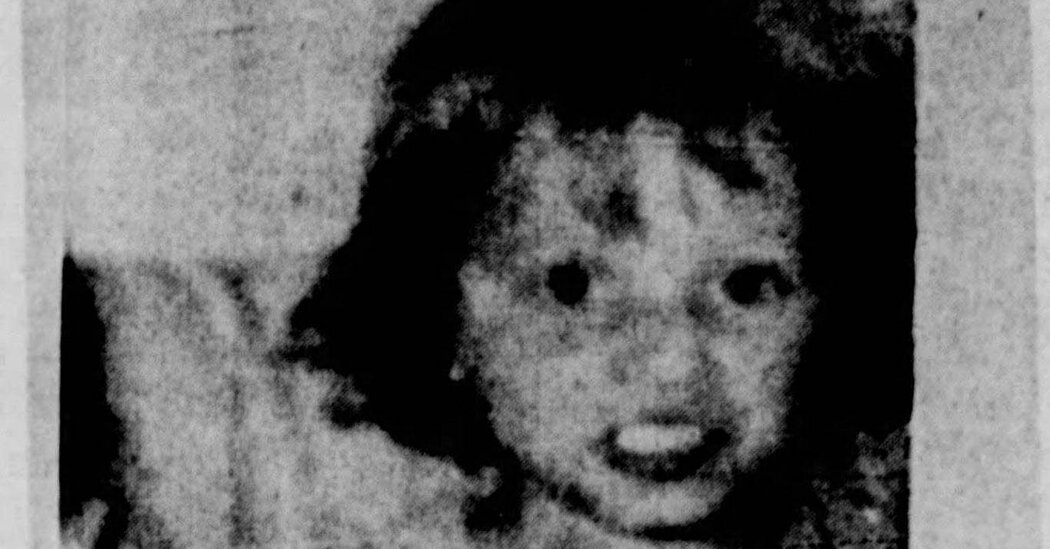
In July 1960, a little girl’s body, decomposed and burned, was found by a hiker in a remote part of Arizona. The child wore a checkered blouse and white shorts. Adult-size flip-flops had been cut to fit her small feet. Her nails were painted red. She became known as “Little Miss Nobody,” because no one could figure out who she was or how she had died.
After more than half a century, she has her name back: She was Sharon Lee Gallegos, and she died when she was 4 years old.
Speaking at a news conference on Tuesday, investigators with the Yavapai County Sheriff’s Office said DNA analysis of the girl’s remains helped link her to relatives, and eventually to a case in Alamogordo, N.M., where she was identified as the young girl who was reported missing on July 21, 1960. It was the oldest cold case that the National Center for Missing and Exploited Children has ever helped solve.
“The unidentified little girl who won the hearts of Yavapai County in 1960 and who occupied the minds and time of Y.C.S.O. and partners for 62 years will now rightfully be given her name back and will no longer need to be referred to as Little Miss Nobody,” the Sheriff’s Office said on Facebook this week.
The authorities said Sharon had been playing with other children in the backyard of her grandmother’s house in Alamogordo when she was abducted by a woman and other unidentified people in a sedan.
Investigators over the years had used old newspaper clippings to try to discern whether the missing child in New Mexico was connected to the remains discovered in Arizona. On Aug. 8, 1960, The Arizona Republic reported there was “some speculation” that the girl found in the desert and the missing Sharon Gallegos were the same person, but the age of the Arizona child had been estimated to be older than 4.
They eventually dismissed the possibility that Sharon Lee Gallegos was the child whose remains were discovered in Arizona because too many elements in the two cases — clothing, dates, footprint comparisons — did not match up, investigators said.
The Arizona child was labeled an “unidentified female child” in a coroner’s report from 1960 and “Jane Yavapai Doe” on missing child posters.
But with the development of DNA technology, the investigators said they were finally able to match the identity of “Little Miss Nobody” to the New Mexico case.
Now that the remains have been identified, Sharon’s relatives have been informed, the authorities said. A nephew, Ray Chavez, said at the news conference that he had grown up hearing about his mother’s missing sister, who he said had been described as “feisty.”
“It was very comforting to know people were still looking,” he added. “It is still sinking in.”
No suspects in her killing have been announced.
The tragic mystery had shocked Prescott, a city in west-central Arizona with a population of about 45,000.
Records and newspaper reports at the time said that on July 31, 1960, a teacher hiking in a remote area outside Congress, Ariz., saw the partly buried body of the child in a sandy creek bed. Investigators believed that she had been dead for at least a week.
In mid-August 1960, the child was given a funeral, using funds raised by residents of Prescott, according to an Associated Press report covering the event. During the ceremony, Dave Palladin, a local radio host, and his wife stood in for her parents.
“Somewhere, someone is watching to learn what happened to a little girl left on the desert,” Charles Franklin Parker, the minister of the city’s First Congregational Church, told the 70 people gathered to mourn the girl no one knew.
“If there has been a misdeed, probably a disquieted conscience will go on and on,” The A.P. quoted him as saying at the service. The small, child-size coffin was affixed with a card that read: “God’s little child. Date of birth unknown, date of death unknown.”
She was buried in Mountain View Cemetery in Prescott, her tombstone engraved with “Little Miss Nobody.”
The F.B.I. broadcast her description nationwide, according to a report in The Arizona Republic in August 1960. The agency said a man’s footprints were found nearby, next to footprints believed to be the girl’s. Tire tracks in the area suggested someone had driven off the road and turned around in the sand wash, it said.
The case, determined to be a homicide, went cold, the authorities said. It is unclear how the girl was killed.
In 2014 investigators, working with the authorities in Colorado on an unrelated cold case, came across the file of “Little Miss Nobody.” Her remains were exhumed in 2018 for DNA analysis, and the Sheriff’s Office in January held a fund-raising drive to support the project, working with Othram, a private laboratory in Texas that assists law enforcement on DNA cases, the local news media reported.
Kitty Bennett contributed research.




